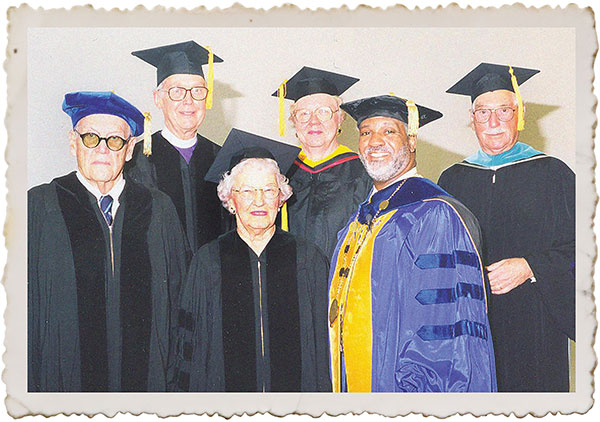
Two years into retirement, Dr. Edward L. Wheeler — longtime president of Christian Theological Seminary in Indianapolis — accepted the call to lead Interdenominational Theological Center (ITC) in Atlanta. He describes the challenges of his new position as “substantial” and the possibilities as “enormous.”
Fundraising is a key to success at any school, and Wheeler brings a lifetime of philanthropy experience to the job. Below, he shares his thoughts on generating financial support for ministry regardless of the setting.
Q You began your career as a pastor. As a young clergyman, did you learn any fundraising lessons?
A When I became a pastor I was determined that the congregation should thoroughly understand our church budget. There were no questions that members couldn’t ask about finances. I talked about the needs in the community around us. I told them about the kids who played on our playground because they had no place else to go. I explained why our church was a tithing church and gave 10 percent of its resources to outside causes.
The response of our members was overwhelming. Giving went up dramatically. This experience helped me understand that people want to know the specific needs that their gifts will address. I learned to go into meetings with donors well-prepared to justify my request and to clearly explain our plans for their gifts.
Q Not every potential donor says “yes.” How do you deal with disappointment?
A I try to never take a “no” personally because I understand there are more good causes than even wealthy people can afford to support. I simply welcome the opportunity to explain what my cause is and why it deserves consideration.
Sometimes a “no” can be a blessing. I remember a family member of two faithful donors telling me that when his parents died, the seminary would not receive an estate gift or any other support. He assured me the decision had nothing to do with any dissatisfaction with the school, but that the children simply had different priorities than their parents.
My board couldn’t believe the news. It took me almost five years to convince them that we had to stop depending on the family’s gifts. In retrospect, the “no” had given us time to make this shift. On further reflection, we saw that our failure was that while the couple was alive, we didn’t ask them to use their influence to introduce us to other people who had the same nature, wealth, and generosity. That was a missed opportunity.
 |
Christian Theological Seminary graduation, 1998
From left: J. Irwin Miller, Bishop Edward "Ted" Jones, Xenia Simons Miller, CTS board chair Sally Rowland, Dr. Edward Wheeler, and P.E. MacAllister. Irwin and Xenia Miller were long-time board leaders and donors to the seminary.
Courtesy Christian Theological Seminary |
Q How do you revive the interest of a lapsed donor?
A Sometimes you can’t. Just recently we noticed that a donor who had been generous to our school for many years was now directing the bulk of his resources to a different institution. I learned the reason was a lack of attentiveness on our part. We had taken the donor for granted, and another institution had stepped in and filled the space.
I contacted him — not to win him back, but to learn how we could improve in the future. I asked if he’d talk to me about our school’s strengths and weaknesses and how we might better connect with donors. He agreed and promised to be totally honest. Our conversation lasted an hour and a half and was tremendously helpful. I don’t know if his “no” will ever turn into a “yes,” but I’m going to use his advice to shape the way we operate going forward. My hope is that I’ll never have to have another conversation with a former donor who feels ignored by our school.
Q If you were mentoring a new seminary president about fundraising, what advice would you share?
A For starters, always show gratitude, regardless of the size of the gift. Add a personal note at the bottom of your typed thank-you letter. Better yet, occasionally send a handwritten note. And don’t limit your correspondence to requests for support. Every now and then drop a line that talks about recent campus successes or upcoming events. In short, keep in touch.
Also get to know your donors well enough to understand what satisfies them. Some appreciate special recognition — their names in the annual report or, if merited, an honorary degree. Others like to give quietly but like the opportunity to talk with other potential donors about generosity and philanthropy.
Q How should a president and development staff divide fundraising duties?
A The president and the development staff must see themselves as a team working together to fulfill the mission. In one of my assignments, I was blessed with a first-rate development officer who had built excellent relationships with donors over the years. Gifts came to the school because the donors believed in the mission and trusted the development officer. When I came on board as president, I asked him to introduce me to those longtime friends so I could assure them nothing was going to change and the development officer would remain the primary conduit for those relationships.
A year or two later when one of the donors made a very large gift to the school, I gave full credit to my officer. I hadn’t cultivated the gift, and my ego didn’t need stroking. What I gave myself credit for was not messing up the relationship!
Q How does the president lead the board in generosity?
A First, you lead by example. As president, my gifts to the institution are second only to my church tithe. I don’t blow a trumpet about how much I give, but I make sure that the board understands I’m contributing at a level that exceeds the minimum level for board membership.
Second, I don’t have a problem telling board members that their generosity opens doors to other people’s generosity. Potential donors, including foundations, want to know that the board is a hundred percent committed to supporting the institution.
Not all board members can write big checks, but they know people who have that capacity. The board helps the president gain access to people with resources. The question is whether they feel comfortable introducing the president to those people.
I try to develop a theology of philanthropy within my board. I want them to understand that people give money because they feel a connection between their belief system and a cause that shares that belief system. Donors are grateful to board members who help make that connection.
Q Do you think of fundraising as ministry?
A Absolutely! If I believe in the ministry of the institution, then I understand that the ministry can’t exist without financial support. The ministry can’t grow without the resources it needs.
Manna from heaven doesn’t usually come in the form of millions of dollars that suddenly turn around an institution. It comes because people with resources believe in an institution.
How can they give if they’ve not heard? How can they give without a compelling story that helps them recognize the relationship between their values and the value of the institution that they’ve been asked to support?
Q So, is a seminary president a minister of fundraising?
A Part of my job is to connect people who have resources with a cause that is vital for the well-being of society. Some potential donors may not be convinced of the value of our seminary’s work, but they listen when I talk about the contributions of our graduates.
I tell them about the graduates who are chaplains in the military, or who are involved in prison ministry, or who start drug rehab programs, or who reach out to persons struggling with HIV as well as those who are pastors or serve in other church-related roles. Giving is part of the Gospel, and I believe people welcome the opportunity to make a difference in the world by giving to something bigger than themselves.